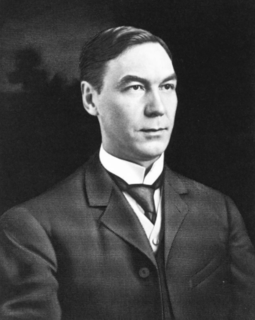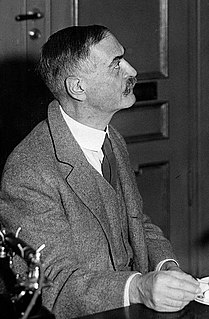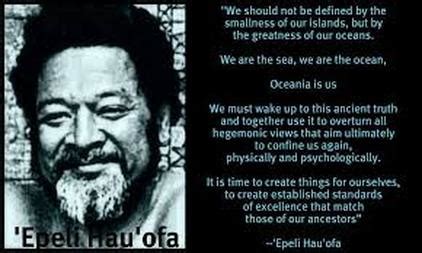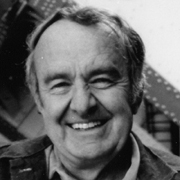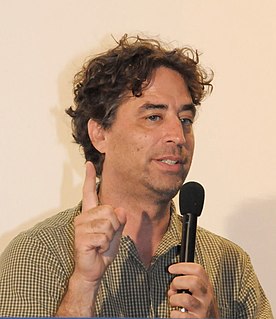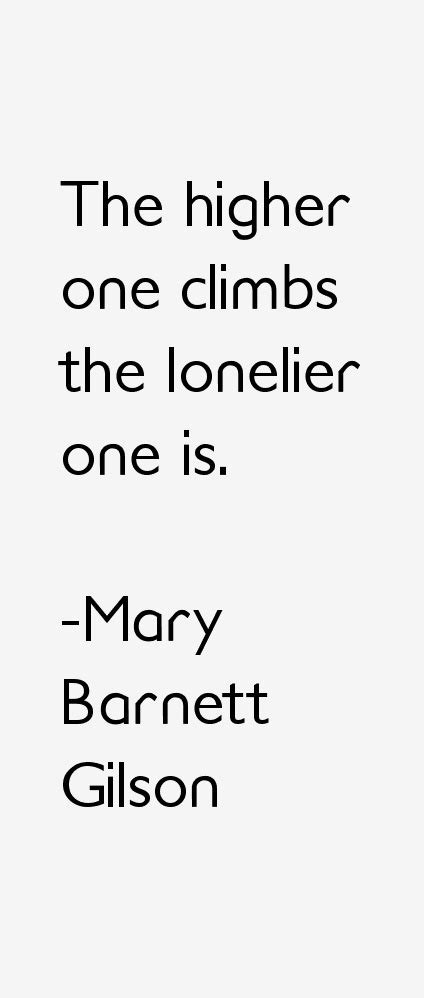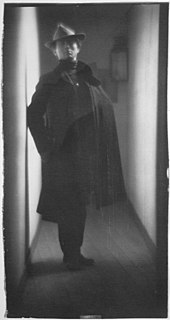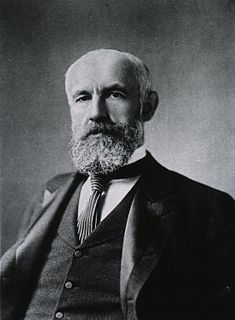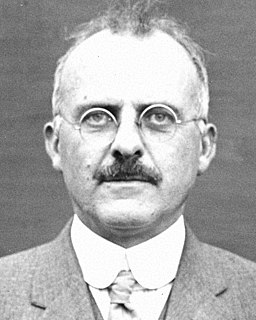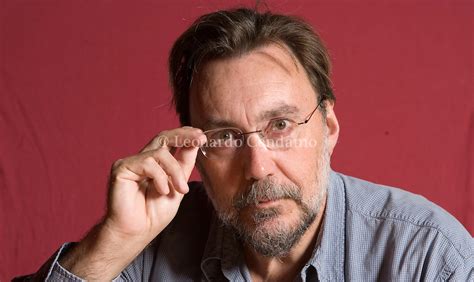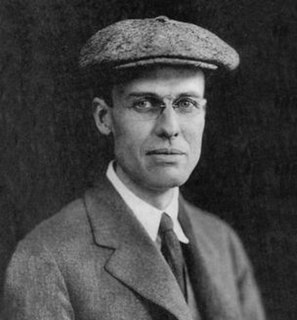Top 827 Conception Quotes & Sayings - Page 14
Explore popular Conception quotes.
Last updated on April 16, 2025.
But that had been grief--this was joy. Yet that grief and this joy were alike outside all the ordinary conditions of life; they were loopholes, as it were, in that ordinary life through which there came glimpses of something sublime. And in the contemplation of this sublime something the soul was exalted to inconceivable heights of which it had before had no conception, while reason lagged behind, unable to keep up with it.
Adam Smith is an egalitarian, he believed in equality of outcome, not opportunity. He is an enlightenment figure, pre-capitalist. He says, suppose in England, one landowner got most of the land and other people would have nothing to live on. He says it wouldn't matter much, because the rich land owner, by virtue of his sympathy for other people would distribute resources among them, so that by an invisible hand, we would end up with a pretty egalitarian society. That is his conception of human nature.
Certainly all "progressive" thought, has assumed tacitly that human beings desire nothing beyond ease, security, and avoidance of pain... Hitler, because in his joyless mind he feels it with exceptional strength, knows that human beings don't only want comfort, safety, short working-hours, hygiene, birth-control and, in general, common sense; they also, at least intermittently, want struggle and self-sacrifice, not to mention drums, flags and loyalty-parades. However they may be as economic theories, Fascism and Nazism are psychologically far sounder than any hedonistic conception of life.
Monopolistic capitalism is to blame for this; it sunders the right to own property from responsibility that owning property involves. Those who own only a few stocks have no practical control of any industry. They vote by postcard proxy, but they have rarely even seen "their" company. The two elements which ought to be inextricably joined in any true conception of private property - ownership and responsibility - are separated. Those who own do not manage; those who manage; those who manage and work do not control or own.
This is a glorious biography ... The time is ripe for a new biography of Edith Wharton of this intimacy and on this scale ... Lee the biographer pursues her subject down every winding corridor, into every hidden passage and dark corner ... Her critical exploration of Edith Whartons work is dazzlingly assured ... A feat of exhaustive research, and finely tuned to Whartons creative achievement at the same time ... [Wharton] could scarcely have failed to be impressed by ... its artistic sympathy, its sonorous depths, and its soaring conception.
The Universal mind is not only intelligence, but it is substance, and this substance is the attractive force which brings electrons together by the law of attraction so they form atoms; the atoms in turn are brought together by the same law and form molecules; molecules take objective forms and so we find that the law is the creative force behind every manifestation, not only of atoms, but of worlds, of the universe, of everything of which the imagination can form any conception.
A different conception of society, very different from that which now prevails, is in process of formation. Under the name of Anarchy, a new interpretation of the past and present life of society arises, giving at the same time a forecast as regards its future, both conceived in the same spirit as the above-mentioned interpretation in natural sciences. Anarchy, therefore, appears as a constituent part of the new philosophy, and that is why Anarchists come in contact, on so many points, with the greatest thinkers and poets of the present day.
A single kind of red cell is supposed to have an enormous number of different substances on it, and in the same way there are substances in the serum to react with many different animal cells. In addition, the substances which match each kind of cell are different in each kind of serum. The number of hypothetical different substances postulated makes this conception so uneconomical that the question must be asked whether it is the only one possible. ... We ourselves hold that another, simpler, explanation is possible.
The public needs art, and it is the responsibility of a ’self-proclaimed artist’ to realize the public needs art, and not to make bourgeois art for the few and ignore the masses. … I am interested in making art to be experienced and explored by as many individuals as possible with as many different individual ideas about the given piece with no final meaning attached. The viewer creates the reality, the meaning, the conception of the piece. I am merely a middleman trying to bring ideas together.
We consult astrology charts like the Babylonians, try to make our children into our own image with a firm hand like the Romans, elbow others to get a breath-quickening glimpse of the queen in her ritual procession, and confess to the priests and attend church. And we wonder why, with all this power capital drawn from so many sources, we are deeply anxious about the meaning of our lives. The reason is plain enough: none of these, nor all of them taken together, represents an integrated world conception into which we fit ourselves with pure belief and trust.
Evil is thus a kind of parasite on goodness. If there were no good by which to measure things, evil could not exist. Men sometimes forget this, and say, there is so much evil in the world that there cannot be a God. They are forgetting that, if there were no God, they would have no way of distinguishing evil from goodness. The very concept of evil admits and recognizes a Standard, a Whole, a Rule, an Order. Nobody would say that his automobile was out of order if he did not have a conception of how an automobile ought to run.
Between the idea And the reality Between the motion And the act Falls the Shadow For Thine is the Kingdom Between the conception And the creation Between the emotion And the response Falls the Shadow Life is very long Between the desire And the spasm Between the potency And the existence Between the essence And the descent Falls the Shadow For Thine is the Kingdom For Thine is Life is For Thine is the This is the way the world ends This is the way the world ends This is the way the world ends Not with a bang but a whimper.
For example, there are numbers of chemists who occupy themselves exclusively with the study of dyestuffs. They discover facts that are useful to scientific chemistry; but they do not rank as genuine scientific men. The genuine scientific chemist cares just as much to learn about erbium-the extreme rarity of which renders it commercially unimportant-as he does about iron. He is more eager to learn about erbium if the knowledge of it would do more to complete his conception of the Periodic Law, which expresses the mutual relations of the elements.
As I would soon learn myself, cleaning up what a parent leaves behind stirs up dust, both literal and metaphorical. It dredges up memories. You feel like you're a kid again, poking around in your parents' closet, only this time there's no chance of getting in trouble, so you don't have to be so sure that everything gets put back exactly where it was before you did your poking around. Still, you hope to find something, or maybe you fear finding something, that will completely change your conception of the parent you thought you knew.
For me, architects and film directors operate similarly. They are practical. As an architect, you know what you want in the conception of a space - but you still need a lot of people to help you out. You need an engineer, interior architects. But a film is the same - you have all these elements. But in terms of concept, it's always about time. When you approach a building, you need time to go from point A to B. Buildings are designed as a journey and films are the same, you have an opening that you come through, an angle you follow, maybe a disruption in space.
The British have their own conception of what constitutes the typical American. He must have a flavor of the Wild West about him. He must do spectacular things. He must not be punctilious about dignity, decorum and other refinements characteristic of the real British gentleman. The Yankee pictured by the Briton must be a bustler. If he is occasionally flagrantly indiscreet in speech and action, then he is so much more surely stamped the genuine article. The most typical American the British ever set their eyes on was, in their judgment, Theodore Roosevelt.
That the past is ahead, in front of us, is a conception of time that helps us retain our memories and to be aware of its presents. What is behind us [the future] cannot be seen and is liable to be forgotten readily. What is ahead of us [the past] cannot be forgotten so readily or ignored, for it is in front of our minds' eyes, always reminding us of its presence. The past is alive in us, so in more than a metaphorical sense the dead are alive - we are our history.
The world is too complicated in all parts and interconnections to be due to chance alone. I am convinced that the existence of life with all its order in each of its organisms is simply too well put together. Each part of a living thing depends on all its other parts to function. How does each part know? How is each part specified at conception? The more one learns of biochemistry the more unbelievable it becomes unless there is some type of organizing principle-an architect.
Through luminous and erudite readings of the texts, Hasana Sharp shows us how profound and radical is Spinoza's conception of nature and his claim that humans always remain part of nature, acting solely according to the same rules. She demonstrates the political consequences of adopting this perspective through a provocative intervention in contemporary feminist theory, while along the way opening promising avenues for future work in a variety of other fields, such as animal studies and ecology. This is a challenging and important book.
Though our brother is upon the rack, as long as we ourselves are at ease, our senses will never inform us of what he suffers. They never did and never can carry us beyond our own persons, and it is by the imagination only that we form any conception of what are his sensations...His agonies, when they are thus brought home to ourselves, when we have this adopted and made them our own, begin at last to affect us, and we then tremble and shudder at the thought of what he feels.
God always was, and always is, and always will be. Or rather, God always Is. For Was and Will be are fragments of our time, and of changeable nature, but He is Eternal Being. And this is the Name that He gives to Himself when giving the Oracle to Moses in the Mount. For in Himself He sums up and contains all Being, having neither beginning in the past nor end in the future; like some great Sea of Being, limitless and unbounded, transcending all conception of time and nature, only adumbrated [intimated] by the mind, and that very dimly and scantily.
Discipleship means adherence to Christ and, because Christ is the object of that adherence, it must take the form of discipleship. An abstract theology, a doctrinal system, a general religious knowledge of the subject of grace or the forgiveness of sins, render discipleship superfluous, and in fact exclude any idea of discipleship whatsoever, and are essentially inimical to the whole conception of following Christ....Christianity without the living Christ is inevitably Christianity without discipleship, and Christianity without discipleship is always Christianity without Christ.
A young professor I watched in action at one of our large eastern colleges used to stand with his back to the class and mumble explanations of blackboard problems. He was "let out" at the end of two years because students refused to attend his classes. He was given an evasive reason for his dismissal and he left with justifiable bitterness toward the administration. If someone had told him the truth he could have avoided this denouement. Sometimes professors go on for years without any conception of remediable faults which irritate their listeners.
Photography is a medium of formidable contradictions. It is both ridiculously easy and almost impossibly difficult. It is easy because its technical rudiments can readily be mastered by anyonwith a few simple instructions. It is difficult because, while while the artist working in any other medium begins with a blank surface and gradually brings his conception into being, the photographer is the only imagemaker who begins with the picture completed. His emotions, his knowledge, and his native talent are brought into focus and fixed beyond recall the moment the shutter of his camera has closed.
The coarsening of our culture towards violent death has more consequences than war. Tragically, this same culture has led to the death of 50 million unborn children in the last 40 years. I don't think a civilization can long endure that does not have respect for all human life, born and not yet born. I believe there will come a time when we are all judged on whether or not we took a stand in defense of all life from the moment of conception until our last natural breath.
The most beautiful conception of immortality of which I know, and certainly one that by contrast shows the utter vulgarity of Christian ideas, is set forth in Pindar's second Olympian: after three or six lives in which a man has lived with strict justice and perfect integrity, he passes beyond the tower of Cronus to the fair realm that cannot be reached by land or sea, where gentle breezes from a placid ocean blow forever on the fields of asphodel. For a description, see Pindar. If the beauty of great poetry can commend a religion, here you have it.
As long as we try to project from the relative and conditioned to the absolute and unconditioned, we shall keep the pendulum swinging between dogmatism and skepticism. The only way to stop this increasingly tiresome pendulum swing is to change our conception of what philosophy is good for. But that is not something which will be accomplished by a few neat arguments. It will be accomplished, if it ever is, by a long, slow process of cultural change - that is to say, of change in common sense, changes in the intuitions available for being pumped up by philosophical arguments.
To the average man, life presents itself, not as material malleable to his hand, but as a series of problems...which he has to solve...And he is distressed to find that the more means he can dispose of-such as machine-power, rapid transport, and general civilized amenities, the more his problems grow in hardness and complexity....Perhaps the first thing he can learn form the artists is that the only way of 'mastering' one's material is to abandon the whole conception of mastery and to co-operate with it in love: whosoever will be a lord of life, let him be its servant.
Memory is therefore, neither Perception nor Conception, but a state or affection of one of these, conditioned by lapse of time. As already observed, there is no such thing as memory of the present while present, for the present is object only of perception, and the future, of expectation, but the object of memory is the past. All memory, therefore, implies a time elapsed; consequently only those animals which perceive time remember, and the organ whereby they perceive time is also that whereby they remember.
Although all studios are now moving towards digitalization, a foundation in which we draw pictures by hand hasn't changed, so I foresee that we will continue to keep it in the future. After all, we used the digital method based on a conception of expanding and advancing the expression of the traditional animation cel in Steamboy. The first goal of this project was to overcome limitations of camera angles caused by platforms. On that aspect, I won't go back to the traditional method. I hoped to combine the merits of the traditional method of cel animation with the merits of the new CGI method.
All possible truth is practical. To ask whether our conception of chair or table corresponds to the real chair or table apart from the uses to which they may be put, is as utterly meaningless and vain as to inquire whether a musical tone is red or yellow. No other conceivable relation than this between ideas and things can exist. The unknowable is what I cannot react upon. The active part of our nature is not only an essential part of cognition itself, but it always has a voice in determining what shall be believed and what rejected.
At one time,' Golenishchev continued, either not observing or not willing to observe that both Anna and Vronsky wanted to speak, 'at one time a freethinker was a man who had been brought up in the conception of religion, law, and morality, who reached freethought only after conflict and difficulty. But now a new type of born freethinkers has appeared, who grow up without so much as hearing that there used to be laws of morality, or religion, that authorities existed. They grow up in ideas of negation in everything - in other words, utter savages.
We think rightly or wrongly about prayer according to the conception we have in our minds of prayer. If we think of prayer as the breath in our lungs and the blood from our hearts, we think rightly. The blood flows ceaselessly, and breathing continues ceaselessly; we are not conscious of it, but it is always going on. We are not always conscious of Jesus keeping us in perfect joint with God, but if we are obeying Him, He always is.
If the estimated age of the cosmos were shortened to seventy-two years, a human life would take about ten seconds. But look at time the other way. Each day is a minor eternity of over 86,000 seconds. During each second, the number of distinct molecular functions going on within the human body is comparable to the number of seconds in the estimated age of the cosmos. A few seconds are long enough for a revolutionary idea, a startling communication, a baby's conception, a wounding insult, a sudden death. Depending on how we think of them, our lives can be infinitely long or infinitely short.
It is certainly a wonderful, a brain-staggering conception... that our own stellar universe may be but one of hundreds of thousands of similar universes... Familiarity with these mighty concepts most certainly does not breed contempt, does not dull our awe at the mightiness of the universe in which we play so small a part. It is very doubtful if any of those who are seriously studying the heavens ever lose their feeling of reverence for this supremely wonderful universe and for Whoever or Whatever must be behind it all.
THE FATHER: But don't you see that the whole trouble lies here? In words, words. Each one of us has within him a whole world of things, each man of us his own special world. And how can we ever come to an understanding if I put in the words I utter the sense and value of things as I see them; while you who listen to me must inevitably translate them according to the conception of things each one of you has within himself. We think we understand each other, but we never really do.
I do not deny God, because that word conveys to me no idea, and I cannot deny that which presents to me no distinct affirmation, and of which the would-be affirmer has no conception. I cannot war with a nonentity. If, however, God is affirmed to represent an existence which is distinct from the existence of which I am a mode, and which it is alleged is not the noumenon of which the word I represents only a speciality of phenomena, then I deny God, and affirm that it is impossible God can be.
In this society, the norm of masculinity is phallic aggression. Male sexuality is, by definition, intensely and rigidly phallic. A man's identity is located in his conception of himself as the possessor of a phallus; a man's worth is located in his pride in phallic identity. The main characteristic of phallic identity is that worth is entirely contingent on the possession of a phallus. Since men have no other criteria for worth, no other notion of identity, those who do not have phalluses are not recognized as fully human.
I've been a freelancer my whole life. It's sort of been my ethos that wherever something takes me, it takes me, so, that was really the start of me trying my hand at whatever it was at the time. I've gone from doing sculpture to videos to being a set builder and working for a general contractor to jewelry maker to now, a rapper... I just love to create. I've had a stint doing pretty much everything! It sort of doesn't matter what it is, as long as I'm doing it. I love to see something from conception to final product. I love trying new things and seeing them through.
Every event has a cause-that is ... for every event e1 there exists an event e2 (or a class of events e2, e3 ...) which precedes e1 and of which e1 is a necessary consequence.... If we assent to this statement then your "choice" to do A rather than B, whatever may have been at the time your sensation of freedom from any constraint, was entirely necessitated. You could not have done otherwise and hence, according to this conception of freedom, were not free.
There is a drowsy state, between sleeping and waking, when you dream more in five minutes with your eyes half open, and yourself half conscious of everything that is passing around you, than you would in five nights with your eyes fast closed, and your senses wrapt in perfect unconsciousness. At such time, a mortal knows just enough of what his mind is doing, to form some glimmering conception of its mighty powers, its bounding from earth and spurning time and space, when freed from the restraint of its corporeal associate.
The moral problem of abortion is of a pre religious nature because the genetic code is written in a person at the moment of conception. A human being is there. I separate the topic of abortion from any specifically religious notions. It is a scientific problem. Not to allow the further development of a being which already has all the genetic code of a human being is not ethical. The right to life is the first among human rights. To abort a child is to kill someone who cannot defend himself.
Philosophy is to be studied, not for the sake of any definite answers to its questions, since no definite answers can, as a rule, be known to be true, but rather for the sake of the questions themselves; because these questions enlarge our conception of what is possible, enrich our intellectual imagination and diminish the dogmatic assurance which closes the mind against speculation; but above all because, through the greatness of the universe which philosophy contemplates, the mind is also rendered great, and becomes capable of that union with the universe which constitutes its highest good.
The prevailing idea seems to be, that I come to God and ask Him for something that I want, and that I expect Him to give me that which I have asked. But this is a most dishonouring and degrading conception. The popular belief reduces God to a servant, our servant: doing our bidding, performing our pleasure, granting our desires. No, prayer is a coming to God, telling Him my need, committing my way unto the Lord, and leaving Him to deal with it as seemeth Him best.
If we apply the term revolution to what happened in North America between 1776 and 1829, it has a special meaning. Normally, the word describes the process by which man transforms himself from one kind of man, living in one kind of society, with one way of looking at the world, into another kind of man, another society, another conception of life.... The American case is different: it is not a question of the Old Man transforming himself into the New, but of the New Man becoming alive to the fact that he is new, that he has been transformed already without his having realized it.
One of the weaknesses of much abstract painting is the attempt to substitute the inventions of the intellect for a pristine imaginative conception. The inner life of a human being is a vast and varied realm and does not concern itself alone with stimulating arrangements of color, form and design. The term 'life' as used in art is something not to be held in contempt, for it applies all of its existence, and the province of art is to react to it and not to shun it. Painting will have to deal more fully and less obliquely with life and nature's phenomena before it can again be great.
God cannot be represented by an image. We ought not to think that the Godhead is like unto gold, or silver, or stone, graven by art and man's device. We wrong God, and put an affront upon him, if we think so. God honoured man in making his soul after his own likeness; but man dishonours God if he makes him after the likeness of his body. The Godhead is spiritual, infinite, immaterial, incomprehensible, and therefore it is a very false and unjust conception which an image gives us of God.





